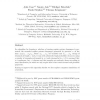Free Online Productivity Tools
i2Speak
i2Symbol
i2OCR
iTex2Img
iWeb2Print
iWeb2Shot
i2Type
iPdf2Split
iPdf2Merge
i2Bopomofo
i2Arabic
i2Style
i2Image
i2PDF
iLatex2Rtf
Sci2ools
ALT
2003
Springer
2003
Springer
Learning a Subclass of Regular Patterns in Polynomial Time
An algorithm for learning a subclass of erasing regular pattern languages is presented. On extended regular pattern languages generated by patterns π of the form x0α1x1 . . . αmxm , where x0, . . . , xm are variables and α1, . . . , αm strings of terminals of length c each, it runs with arbitrarily high probability of success using a number of examples polynomial in m (and exponential in c ). It is assumed that m is unknown, but c is known and that samples are randomly drawn according to some distribution, for which we only require that it has certain natural and plausible properties. Aiming to improve this algorithm further we also explore computer simulations of a heuristic. 1 Supported in part by NSF grant number CCR-0208616 and USDA IFAFS grant number 01-04145. 2 Supported in part by NUS grant number R252-000-127-112. 3 Supported in part by NUS grant number R252-000-212-112. Most work was done while F. Stephan stayed with the National ICT Australia which is funded by the Aust...
Related Content
| Added | 15 Mar 2010 |
| Updated | 15 Mar 2010 |
| Type | Conference |
| Year | 2003 |
| Where | ALT |
| Authors | John Case, Sanjay Jain, Rüdiger Reischuk, Frank Stephan, Thomas Zeugmann |
Comments (0)

